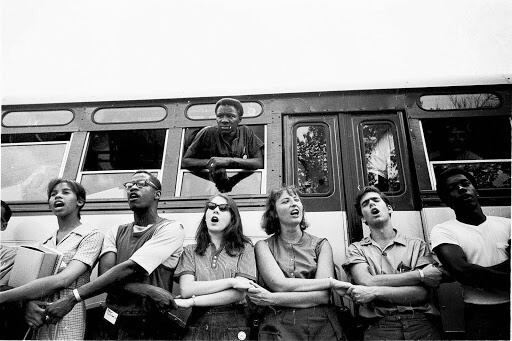“Freedom Riders” family matinee explores one of the most critical chapters of the civil rights movement
ABOUT THE SHOW
Freedom Riders is the newest play from Mad River Theater Works. It explores valiant and courageous personalities behind one of the most critical chapters in the history of the civil rights movement, the freedom riders. The play demonstrates the importance of working together to affect change and specifically how non-violent protest was used to combat the cruelties of segregation. Set in 1961, fifteen years after the United States Supreme Court had outlawed segregation, bus lines and cities throughout the south still enforced a rigid system of separating black and white citizens. Freedom riders, both black and white, mostly young, Americans, decided to travel together on buses that crossed state lines purposefully disregarding the hateful segregation practices that were still commonplace in so many parts of the United States. The unforgettable heroes and the facts behind the events portrayed in Freedom Riders are essential to a full understanding of the civil rights era and American history.
THE FREEDOM RIDERS
In the wake of the abolition of slavery in the United States, many southern states which had previously been part of the confederacy started to make laws to keep the states’ black citizens at a disadvantage. Many of those laws limited black citizens’ right to vote in elections, and others, known commonly as Jim Crow Laws mandated a policy called segregation which ensured that among schools, there would be black schools and white schools, that among bathrooms there would be black bathrooms and white bathrooms, and famously that on public busses, seats at the front would be reserved for white patrons while black customers were forced to sit in the back.
Debatably, the first freedom ride was the 1947 Journey of Reconciliation sponsored by C.O.R.E, the Congress of Racial Equality. The 16 men (8 black, 8 white) rode public transportation in Virginia, North Carolina, Tennessee, and Kentucky. They suffered several arrests in almost every state they visited.
On December 1, 1955, the Civil Rights icon, Rosa Parks, famously refused to give up her seat on a segregated city bus in Montgomery, Alabama, for which she was jailed. Parks was not the first person to fight back against these segregations, but her actions began the Montgomery Bus Boycott, a cornerstone of American Civil Rights history.
Five years later, in Greensboro, North Carolina, the first major student protest began when four black men from a local college staged a sit-in at a segregated lunch counter. Over time, because the four’s sit-in was reported in newspapers all across the southern states, leading students and activists from all over the country began to start their own sit-ins resulting in the closure of many segregated lunch counters.
The freedom rides began in 1961 in response to the refusal of southern states to enforce two Supreme Court rulings (Morgan v. Virginia and Boynton v. Virginia) both of which demanded the desegregation of interstate bus travel. Over time, the freedom rides became one of the largest student protests in American history, but it all started with one bus.
About the Company
Mad River Theater Works is a professional touring theater company located in the rural village of Zanefield, OH. We create plays that combine music and drama to tell stories about people from the back roads and small towns of America. We believe that theater can make a difference. Our plays, rooted in American history, examine the choices we face in a complex world. In particular, our work focuses on the importance of culture and community. Through theater we strive to challenge racism, xenophobia, sexism and intolerance.
Since 1978, we have collected stories, molded this material into plays, and performed our work at community centers, schools, colleges and theaters throughout the United States reaching an annual audience of over 100,000 with over 100 performances. Mad River Theater Works is one of only a handful of professional theaters in the United States based in rural communities. Our unique mission has attracted the support of the National Endowment for the Arts, as well as foundations, corporations and individuals.
